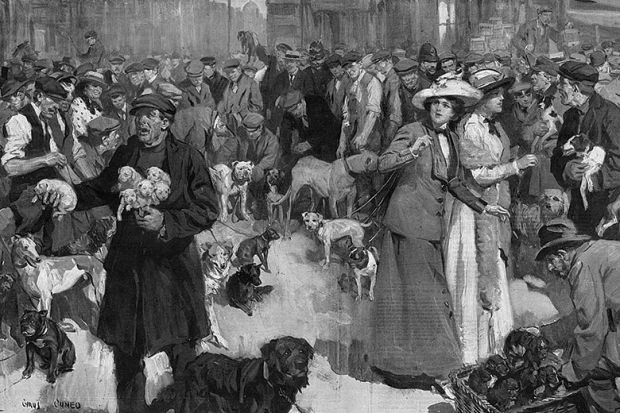Our earliest domesticates, dogs have always inhabited our built environments like no other creatures. Cities from the ancient world through to the present are riddled with evidence of human-canine cohabitation. Less clear are the indicators that dogs had an influence on the ways in which we make our urban environments work, let alone work well for us and them alike. Chris Pearson’s study of the modernisation of three major metropoles makes a thrilling and sometimes chilling case that dogs played active roles in the story of how we together became predominantly urban species.
Drawing from a wide range of source materials, Pearson shows how fantasies and fears peculiar to the rise of middle-class standards of living took root in the making of modern New York, London and Paris, often through the international traffic in ideas about the best ways to manage more-than-human crowds. “Dogopolis” is Pearson’s shorthand for the historically recent “model of Western human-canine relations” as “civilized, healthy, and safe” that marks Eurowhite cultures today. Through archival research, he pieces together when and how it emerged, “slowly, and sometimes agonizingly”, and why it remains “somewhat shaky”.
With chapters devoted to different canine-identified behaviours – namely, straying, biting, suffering, thinking and defecating – Dogopolis explores how a consensus emerged on the most socially acceptable responses to dogs being dogs in the city from the beginning of the 19th and into the 20th centuries. While Pearson makes each of these subjects fascinating, his story of their interrelatedness is even more compelling. “In removing straying and biting dogs” by the hundreds of thousands in this period, he concludes, “humane killing was essential to the building of dogopolis” as a utopia for some at the expense of others, a place “in which dogs closest to humans – pet and police dogs – would have the figurative keys to the city”.
Just like the other excellent historians of animal life cited throughout, Pearson highlights what we can learn about how we arrived where we are today by studying patterns in our behaviours toward nonhuman animals. Well-intentioned “removal” tactics changed from hanging, bludgeoning and drowning to death by lethal injections and mass fumigation. The eventual institutionalisation of gas chambers as the humane “solution” to all three cities’ problems with “unwanted populations” in the interwar period adds contextual complexity to what it meant to inhabit these colonial centres amid the rise of modern genocide.
In the Covid era, the lessons of Dogopolis help us think about where the human race is going. Free-ranging dogs were justifiably feared when there was no prevention or cure for rabies. But Pearson’s documentation of the deeply mixed reception of Louis Pasteur’s pioneering vaccine has eerie resonances, especially when he cites dissenters using the anti-science, xenophobic rhetoric that is proving so deadly today. My own wider-ranging research on the social and cultural history of canis familiaris long ago led me to the conclusion that the creature powerful enough to be “man’s best friend” also feeds our deepest fears and prejudices. Pearson’s in-depth study of the modernisation of this dynamic in three Western capitals adds resounding confirmation that dogs prove faithful mirrors of humans’ ever-failing aspirations to humanity.
Susan McHugh is professor of English at the University of New England and author of several books, including Dog in Reaktion Books’ Animal series.
Dogopolis: How Dogs and Humans Made Modern New York, London, and Paris
By Chris Pearson
University of Chicago Press, 256pp, £76.00 and £20.00
ISBN 9780226796994 and 9780226798165
Published 5 October 2021



